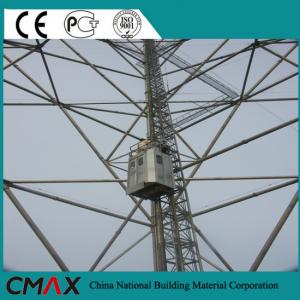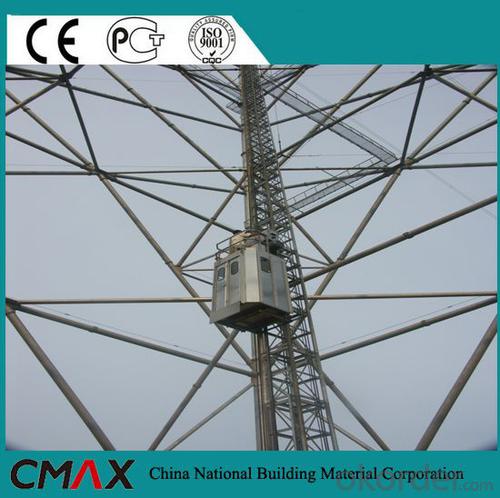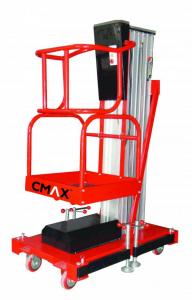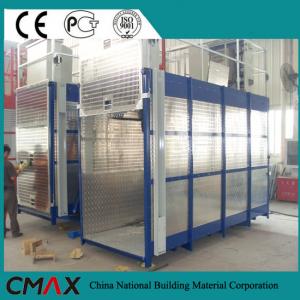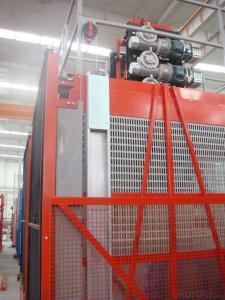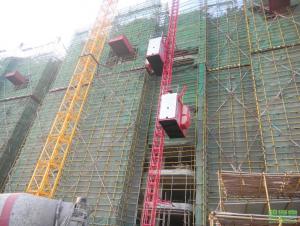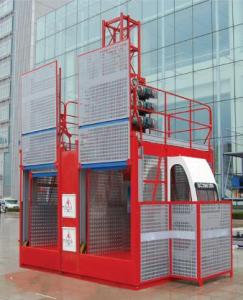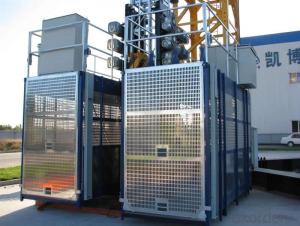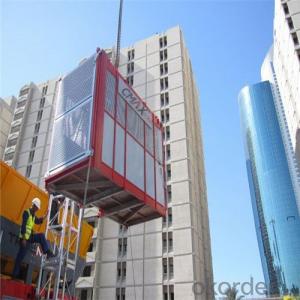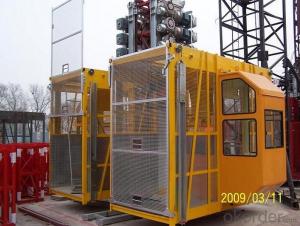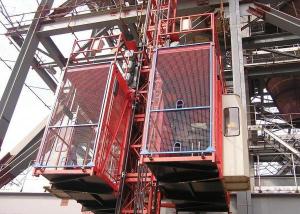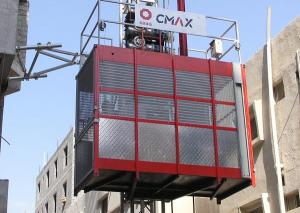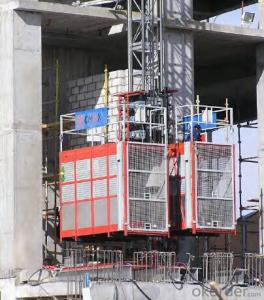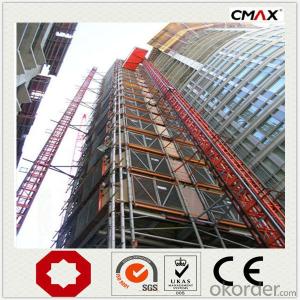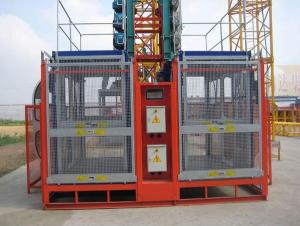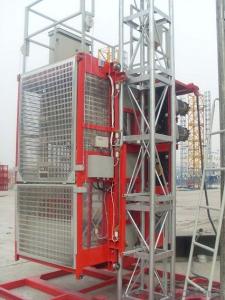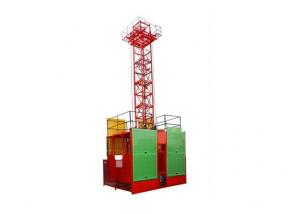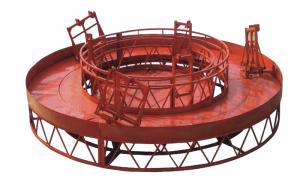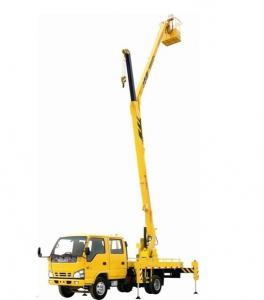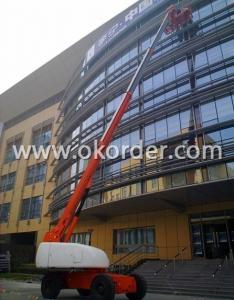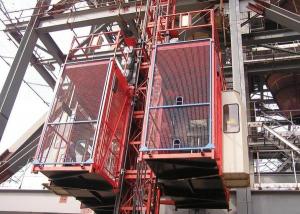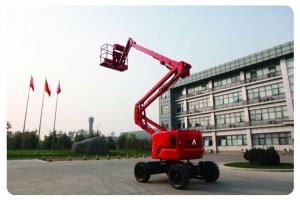Construction Hoist SC120/120 Lifting Elevator
- Loading Port:
- China main port
- Payment Terms:
- TT or LC
- Min Order Qty:
- 1 unit
- Supply Capability:
- 30 unit/month
OKorder Service Pledge
OKorder Financial Service
You Might Also Like
Structure of Construction Hoist Description
Feature: Construction Hoist Condition: New Application: Construction
Payload(kg):2*1200 Lifting Speed(m/min):33 Motor Power(kw): 2*2*11
Safety Device: 2*SAJ30-1.2 Cage: Twin Counterweight: No
Certification: CE,ISO Place of Origin: China(Mainland) Model Number: Type:SC120/120
Packaging & Delivery of Construction Hoist
Packaging Detail: Nude package Delivery Detail: 25-30days
Main Parts of Construction Hoist
● The gearing adopts imported bearing, enameled cable, and oil seal.
● The electric parts adopt products from world renowned manufactures such as Schneider, Siemens, and LG.
● The racks and pinion adopts special material and heat-treatment technique, which prolong the life of these parts.
● The steel structure uses quality steel from famous domestic manufactures.
● The surface of the structure can apply paint-spray, parkerozing baking finish or hot galvanizing processing according
to users requirements,
● The cage can be produced and decorated by aluminum molded board, punched-plate or figured aluminm board.
Construction Hoist Specifiction
Single cage High speed
Model | Speed(m/min) | Deadweight(kg) | Motor(KW) | Counterweight | Specification(L×W×H)(m) |
SC100G | 96 | 1000 | 3×22 | No | 2.5×1.3×2.5 |
SC120G | 96 | 1200 | 3×22 | NO | 3.0×1.3×2.5 |
SCD200G | 96 | 2000 | 3×15 | Have | 3.2×1.5×2.5 |
SC200G | 96 | 2250 | 3×22 | No | 3.2×1.5×2.5 |
SC270GS | 96 | 2700 | 3×22 | No | 3.8×1.5×2.5 |
SCD270G | 96 | 2700 | 3×18.5 | Have | 3.8×1.5×2.5 |
SCD300G | 96 | 3000 | 3×22 | Have | 4.0×1.5×2.5 |
SCD320GS | 96 | 3200 | 3×22 | Have | 4.2×1.5×2.5 |
Single cage Medium speed
SC100GZ | 63 | 1000 | 3×15 | No | 2.5×1.3×2.5 |
SC120GZ | 63 | 1200 | 3×15 | No | 3.0×1.3×2.5 |
SCD200GZ | 63 | 2000 | 2×15 | Have | 3.0×1.3×2.5 |
SC200GZ | 63 | 2000 | 3×18.5 | No | 3.0×1.3×2.5 |
SC225GZ | 63 | 2250 | 2×18.5 | No | 3.2×1.5×2.5 |
SC225GZ | 63 | 2250 | 3×18.5 | Have | 3.6×1.5×2.5 |
SCD250GZ | 63 | 2500 | 2×18.5 | Have | 3.6×1.5×2.5 |
SC250GZ | 63 | 2500 | 3×18.5 | Have | 3.8×1.5×2.5 |
SCD270GZ | 63 | 2700 | 2×18.5 | Have | 3.8×1.5×2.5 |
SC270GZ | 63 | 2700 | 3×22 | NO | 4.0×1.5×2.5 |
SCD300GZ | 63 | 3000 | 3×15 | Have | 4.0×1.5×2.5 |
SCD320GZ | 63 | 3200 | 3×15 | Have | 4.2×1.5×2.5 |
Single cage standard speed
SC100TD | 36 | 1000 | 2×11 | NO | 2.5×1.3×2.5 |
SC120TD | 36 | 1200 | 2×11 | NO | 3.0×1.3×2.5 |
SC200TD | 36 | 2000 | 3×11 | NO | 3.0×1.3×2.5 |
SCD200TD | 36 | 2000 | 2×11 | Have | 3.2×1.5×2.5 |
SC270TD | 36 | 2700 | 3×15 | NO | 3.6×1.5×2.5 |
SCD270TD | 36 | 2700 | 2×11 | Have | 3.8×1.5×2.5 |
SC320TD | 36 | 3200 | 3×18.5 | NO | 4.0×1.5×2.5 |
SCD320TD | 36 | 3200 | 2×11 | Have | 4.2×1.5×2.5 |
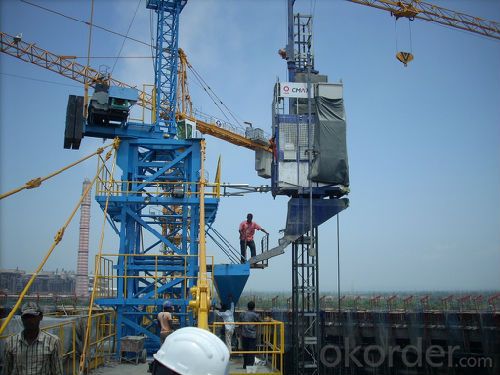
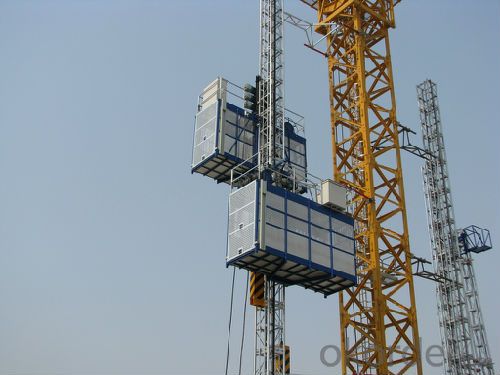
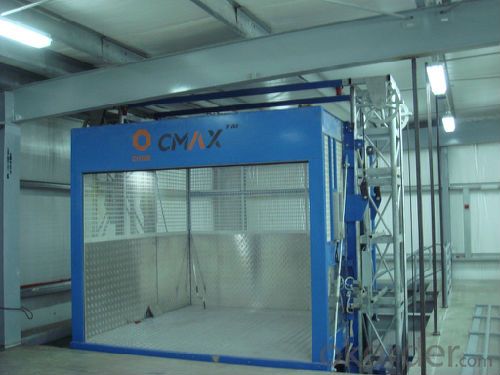
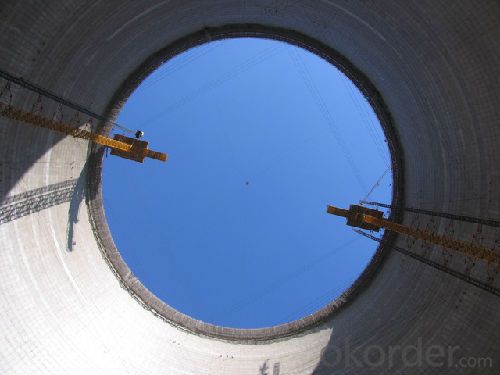
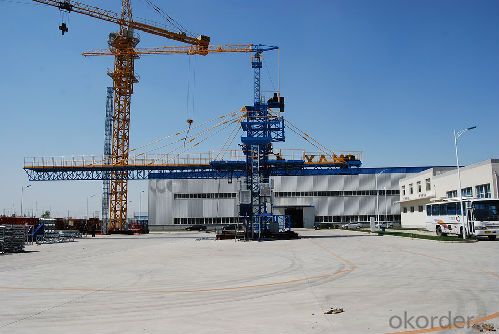
- Q: This question asks whether a building hoist can be utilized in both indoor and outdoor environments for lifting objects.
- <p>Yes, a building hoist can be used both indoors and outdoors for lifting objects. These hoists are designed to handle heavy materials and are often used in construction settings. However, their use is subject to specific conditions and safety requirements. Outdoor use may require additional considerations such as weatherproofing and stability in various weather conditions, while indoor use must adhere to space limitations and structural integrity of the building. Always ensure that the hoist is suitable for the environment and that all safety protocols are followed to prevent accidents.</p>
- Q: The construction elevator can not operate during the use of several stages of wind power
- The top wind speed is no more than 20m/s, which is level 8, the gale level 17.2-20.7 m/s, I am a tower crane and construction elevator accessories. I hope my answer will help you.
- Q: This question asks about the process of installing a new building hoist, which is a piece of equipment used in construction to lift materials and personnel.
- <p>Installing a new building hoist involves several steps: 1) Site preparation, ensuring the area is clear and level. 2) Unpacking and inspecting the hoist components for any damage. 3) Assembling the hoist tower, starting with the base and working upwards. 4) Installing the drive unit and cable system. 5) Attaching the counterweight and safety devices. 6) Rigging the hoist to the building structure for stability. 7) Conducting a thorough inspection and testing the hoist for safety and functionality. 8) Obtaining any necessary permits and approvals. 9) Training operators on the safe use of the hoist. It's crucial to follow the manufacturer's instructions and local regulations when installing a building hoist.</p>
- Q: Is it possible to utilize a building hoist for construction purposes?
- <p>Yes, a building hoist is specifically designed for use in construction work. It is a type of lifting equipment used to transport materials and personnel vertically within a building under construction. Building hoists are essential for efficient material handling, reducing manual labor, and ensuring the safety of workers by providing a stable and controlled method of vertical transportation. They are commonly used in high-rise construction projects and are an integral part of the construction process.</p>
- Q: Is it possible for a building hoist to lift more than one object simultaneously?
- <p>Yes, a building hoist can lift multiple objects at once, provided the combined weight does not exceed the hoist's maximum load capacity. The hoist's design and specifications will dictate how many and what types of objects can be lifted simultaneously. It's crucial to follow the manufacturer's guidelines to ensure safety and prevent damage to the hoist or the objects being lifted.</p>
- Q: Describe the key differences between electric and manual building hoists.
- <p>Electric building hoists are powered by electricity and can lift heavy loads quickly and efficiently. They are automated, reducing manual labor and increasing productivity. On the other hand, manual hoists require human effort to operate, making them slower and less efficient. They are less costly but demand more physical labor, which can lead to fatigue and potential accidents. Electric hoists are suitable for large-scale construction projects, while manual hoists are often used in smaller, more confined spaces where electricity might not be readily available or where the load is not excessively heavy.</p>
- Q: Is it possible to utilize a building hoist for construction or renovation purposes?
- <p>Yes, a building hoist is commonly used for construction and renovation work. It is designed to lift materials and workers vertically, making it an essential tool for multi-story construction projects. Hoists facilitate the movement of heavy materials like cement, bricks, and steel, as well as personnel, enhancing efficiency and safety on the construction site. They are particularly useful in scenarios where cranes are impractical or unavailable, making them a vital component in the construction and renovation process.</p>
- Q: Safety device for construction elevator
- Many 1, 2, upper and lower limit for safety device 3 TDD, extreme limit 4, buffer spring 5, has threshold position switch, single threshold position switch 7, 6 top and limit switch 8 TDD, enclosure door lock 9, lock line 10, has locks There are a lot of electrical safety protection
- Q: This question asks if it is permissible to use a building hoist for the purpose of lifting people.
- <p>No, a building hoist should not be used for lifting people. Building hoists are designed for the transportation of materials and equipment during construction, not for carrying personnel. Using a building hoist to lift people is dangerous and against safety regulations. It poses significant risks, including falls and equipment malfunctions, which can lead to serious injuries or fatalities. Always use designated personnel lifts or other safe methods for moving people in construction settings.</p>
- Q: Is it possible to replace an electric motor with a hydraulic cylinder in an electric-hydraulic lifting system?
- <p>No, a hydraulic cylinder cannot be used in place of a motor in an electric-hydraulic lifting system. A hydraulic cylinder is a component that converts hydraulic pressure into linear motion, while an electric motor converts electrical energy into mechanical energy. In an electric-hydraulic system, the motor drives a hydraulic pump, which generates the pressure needed to actuate the cylinder. The motor is essential for providing the power source, and the cylinder is the actuator that uses this power to perform work. Replacing the motor with a cylinder would result in a system without a power source, rendering it inoperative.</p>
Send your message to us
Construction Hoist SC120/120 Lifting Elevator
- Loading Port:
- China main port
- Payment Terms:
- TT or LC
- Min Order Qty:
- 1 unit
- Supply Capability:
- 30 unit/month
OKorder Service Pledge
OKorder Financial Service
Similar products
Hot products
Hot Searches
Related keywords
